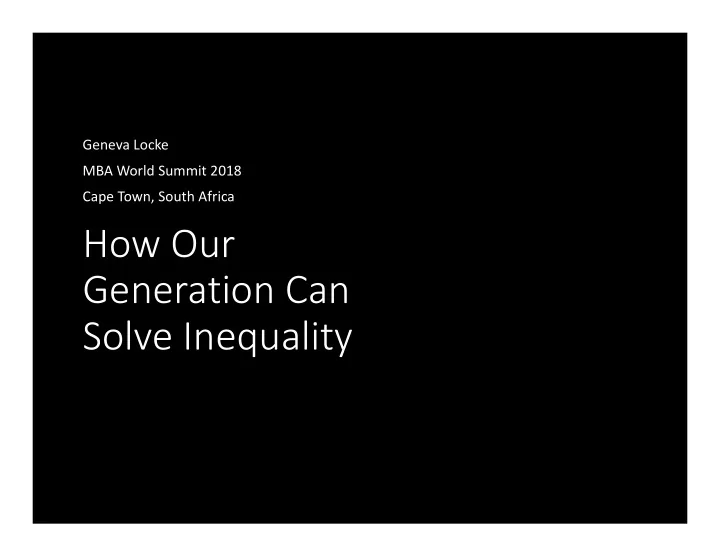

Geneva Locke MBA World Summit 2018 Cape Town, South Africa How Our Generation Can Solve Inequality
Intro and Agenda • Introduction • What is inequality? • Why does it matter? • What is being done about it? • What can we do about it?
Introduction • Who I am • I’m Geneva Locke and I’m lucky! • Why present this? • Story in SF • Empathy gap • Corporations are becoming increasingly powerful • Important for MBAs as future decision makers
What is inequality?
What is inequality? Economic inequality is the difference found in various measures of economic well ‐ being among individuals in a group, among groups in a population, or among countries. Different types: Income Inequality Wealth Inequality Horizontal and Vertical Inequality
Income inequality • Income inequality is the extent to which income is distributed unevenly in a group of people. • Measures include: • Gini coefficient • Share to top 1%, 10%
Current Gini Coefficients
Rise in Income of the Global 1%
Wealth inequality • Wealth inequality refers to the unequal distribution of assets in a group of people. • Oxfam Report, 2018: • 82% of all wealth created last year went to top 1% • 0 went to bottom 50% • Top 1% of wealth holders have more wealth than bottom 99% combined • 8 richest people have same wealth as poorest 50% of the world. 3.6 billion people.
Horizontal and Vertical Inequality • Horizontal Inequality is defined as inequality among culturally defined (or constructed) groups (racial groups, men and women, etc.) • Vertical Inequality which is inequality among households or individuals • Superstar effect: • Are the best that much better? • Is superstar pay justified?
Inequality between countries and within countries • The major component of the world's income inequality (the global Gini coefficient) is comprised by two groups of countries: • The first group has 13% of the world's population and receives 45% of the world's PPP income. This group includes the United States, Japan, Germany, the United Kingdom, France, Australia and Canada, and comprises 500 million people with an annual income level over 11,500 PPP$. • The second group has 42% of the world's population and receives only 9% of the world PPP income. This group includes India, Indonesia and rural China, and comprises 2.1 billion people with an income level under 1,000 PPP$. • Inequality is also growing within countries creating not only inequality of outcomes but also inequality of opportunities
Discussion Discussion (en (end at at ~12: ~12:20) 20) • Which type of inequality is the most problematic? • Income inequality • Wealth inequality • Horizontal and Vertical Inequality • Inequality between countries and within countries • Are some types of inequality OK? • Is inequality natural?
Why does this matter?
Why does this matter? • “Defining challenge of our time” – Barack Obama • Inequality is on the rise • Many negative correlations
Top 1% income shares across the world, 1980–2016
Changes to Gini Coefficients
Why is inequality on the rise? • Increased globalization • Technological change • Labour market changes • Less progressive taxation • Increased influence of money in policy ‐ making
Consequences of Inequality • Social mobility • Public institutions • Wellbeing and health • Growth • Social cohesion • Political implications • Business Impacts
Social Mobility
“The Great Gatsby Curve”
Public Institutions • Inequality is linked to a lack of funding and support for: • Universities • Public health care • Public education • Tax collection • Programs that help young and old
Wellbeing and Health • Life expectancy, infant mortality and obesity have all been linked to inequality
Growth • Research at the IMF and elsewhere makes it clear that persistent lack of inclusion—defined as broadly shared benefits and opportunities for economic growth—can fray social cohesion and undermine the sustainability of growth itself. • Growth that excludes large portions of the population reinforces inequality in a variety of ways, like access to education, technology, resources and even social connections that help individuals land jobs and remain relevant in the labor market.
Political Implications • Inequality has political implications and has been linked to the global rise in populism • As more people feel excluded from economic growth, they will try to find alternative solutions such as: • Anti ‐ trade legislation • Anti ‐ immigration • Increased crime
Business Impacts • Corporate and individual tax cuts • Rise in use of offshore tax havens • Anti ‐ regulation • Increased use of lobbying • Changing priorities of large corporations, further driving the need for aid and subsidies
Discussion Discussion (t (to end end at at ~12: ~12:40) 40) • Is the rise of inequality an issue? • What do you think are the causes? • What do you think will happen in the future? • Should we try to avoid these consequences? Are some of them inevitable?
Solutions
Solutions • Progressive taxation • Education • Health care • Merit ‐ based systems • Unionization, living wages, corporate pay equity • Benefits programs
Progressive taxation
Universal Basic Income • New kind of welfare regime in which all citizens (or permanent residents) of a country receive a regular, liveable, and unconditional sum of money, from the government. • Supporters include many tech executives including Elon Musk, as well as Stephen Hawking
Organizations • UN (UNICEF and UNESCO) • UN Sustainable Development Goal 10 is “Reduced Inequalities” • Association for Childhood Education, Education International, Global Partnership for Education, Save the Children • Global Alliance for Tax Justice
What can we do about it? • Country: political parties, institutions (education and health care), environment • Corporations: wages, merit and internal promotions, environment • Personally: taxation, donations, volunteering
Discussion Discussion • Do you believe that these solutions will work? • What are the blockers to these solutions and how can they be avoided? • What will you try to do in the future to help reduce inequalities?
Recommend
More recommend